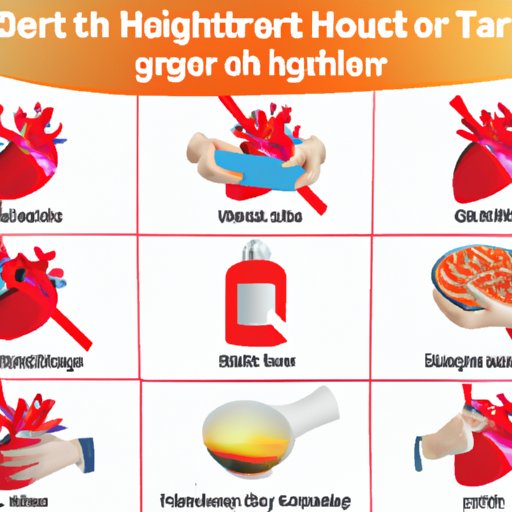Introduction
Heartburn is a common digestive complaint that affects many people. It is caused by stomach acid backing up into the esophagus, which is the tube connecting your throat to your stomach. While it can be uncomfortable, there are several things you can do to help reduce or prevent heartburn.
Heartburn is also known as acid indigestion, acid reflux, or gastroesophageal reflux disease (GERD). Symptoms of heartburn commonly include chest pain, burning in the throat, sour taste in the mouth, and difficulty swallowing.
Avoid Common Heartburn Triggers
Certain foods and drinks can trigger heartburn symptoms. To help reduce your risk of experiencing heartburn, it’s important to avoid common triggers.
Citrus Fruits
Citrus fruits such as oranges, lemons, and grapefruits are among the most common heartburn triggers. The high acid content in these fruits can irritate the lining of your esophagus, leading to heartburn.
Spicy Foods
Spicy foods like hot peppers, chili powder, and salsa can cause heartburn. These foods contain capsaicin, a compound that can irritate the lining of your esophagus and contribute to heartburn.
Tomatoes
Tomatoes are highly acidic, which can lead to heartburn. Tomato-based products such as ketchup, spaghetti sauce, and salsa should also be avoided if you’re prone to heartburn.
Garlic and Onions
Garlic and onions are both known to trigger heartburn. They both contain sulfurous compounds that can irritate the lining of your esophagus.
Carbonated Beverages
Drinking carbonated beverages such as soda, beer, and sparkling water can cause heartburn. The carbonation in these drinks can cause gas to build up in your stomach, which can push stomach acid up into your esophagus.
Eat Smaller Meals More Frequently
Eating smaller meals more frequently throughout the day can help reduce your risk of heartburn. This is because eating large meals can put pressure on the lower esophageal sphincter (LES), which is a muscle located at the bottom of your esophagus. When the LES is weakened, it can allow stomach acid to back up into your esophagus, leading to heartburn.
Benefits of Eating Smaller Meals
Eating smaller meals more frequently has several benefits for reducing your risk of heartburn. It can help keep your stomach from becoming overly full, which can put too much pressure on your LES. It can also help prevent overeating, which can lead to indigestion and heartburn.
Examples of Healthy Meal Options
Healthy meal options that can help reduce heartburn include lean proteins such as fish and chicken, high-fiber carbohydrates such as oatmeal and quinoa, and healthy fats such as nuts and avocados. Aim to eat five to six small meals throughout the day instead of three larger meals.
Don’t Lie Down After Eating
Lying down after eating can increase your risk of heartburn. This is because gravity can pull stomach acid back up into your esophagus when you’re lying down.
Reasons Not to Lie Down After Eating
In addition to increasing your risk of heartburn, lying down after eating can also make it harder for your body to digest food properly. This can lead to indigestion, bloating, and other digestive issues.
Other Activities to Do Instead of Lying Down
Instead of lying down after eating, try going for a walk or engaging in light activity. This can help aid digestion and reduce your risk of heartburn. You can also try sitting upright for at least 30 minutes after eating.

Elevate Your Head While Sleeping
Sleeping with your head elevated can help reduce your risk of heartburn. This is because gravity can help keep stomach acid from backing up into your esophagus while you’re asleep.
Benefits of Elevating Your Head
Elevating your head while sleeping can help reduce your risk of heartburn. It can also help reduce snoring and improve your quality of sleep.
Ways to Elevate Your Head While Sleeping
There are several ways to elevate your head while sleeping. You can use extra pillows to prop your head and upper body up, or you can invest in an adjustable bed frame to raise the top portion of your mattress. Alternatively, you can purchase a wedge pillow that helps keep your head and upper body elevated while you sleep.
Quit Smoking
Smoking can increase your risk of heartburn. This is because smoking can weaken the LES, allowing stomach acid to back up into your esophagus.
Health Benefits of Quitting Smoking
In addition to reducing your risk of heartburn, quitting smoking can also have numerous health benefits. It can reduce your risk of developing certain cancers, improve your cardiovascular health, and decrease your risk of respiratory illnesses.
Resources to Help You Quit Smoking
If you’re looking to quit smoking, there are several resources available to help you. Your doctor can provide advice and guidance on quitting smoking. There are also support groups and online communities to help you stay motivated and on track with your quit plan.
Try Over-the-Counter Medications
Over-the-counter medications can help relieve heartburn symptoms. Antacids such as Tums and Rolaids can help neutralize stomach acid and provide quick relief. H2 blockers such as Pepcid and Zantac can help reduce stomach acid production.
Types of Over-the-Counter Medications
Antacids and H2 blockers are the most common types of over-the-counter medications for heartburn. Proton pump inhibitors (PPIs) such as Prilosec and Nexium can also be used to treat frequent heartburn. However, PPIs should only be used for more severe cases of heartburn.
Potential Side Effects of Over-the-Counter Medications
While over-the-counter medications can provide relief from heartburn, they can also have potential side effects. Common side effects include constipation, diarrhea, and headache. If your symptoms persist or worsen despite taking over-the-counter medications, talk to your doctor.
Conclusion
Heartburn is a common digestive issue that can be uncomfortable and difficult to manage. Fortunately, there are several things you can do to help reduce or prevent heartburn. Avoiding common triggers such as citrus fruits, spicy foods, and carbonated beverages, eating smaller meals more frequently, and quitting smoking can all help reduce your risk of heartburn. Additionally, elevating your head while sleeping and taking over-the-counter medications can provide relief from heartburn symptoms.
If your symptoms persist or worsen despite making lifestyle changes, talk to your doctor. They can provide additional advice and guidance on managing your heartburn.
(Note: Is this article not meeting your expectations? Do you have knowledge or insights to share? Unlock new opportunities and expand your reach by joining our authors team. Click Registration to join us and share your expertise with our readers.)
